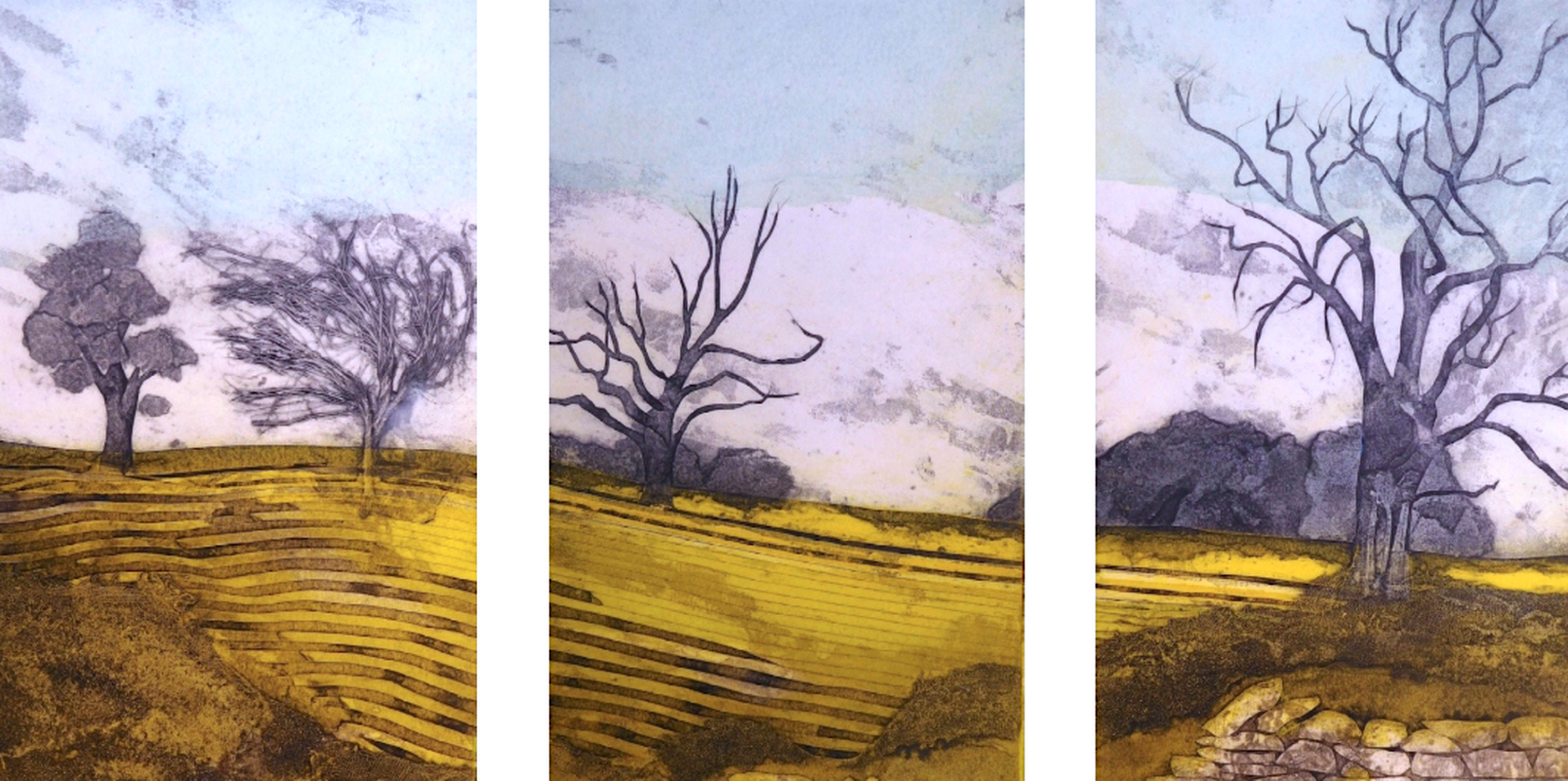
SARAH ROSS-THOMPSON AND THE ART OF COLLAGRAPHED PRINTS
I interviewed artist Sarah Ross-Thompson whose exceptional Collagraphed prints use fabrics, lichen, porridge and string to create images of the dramatic Scottish Highlands where she
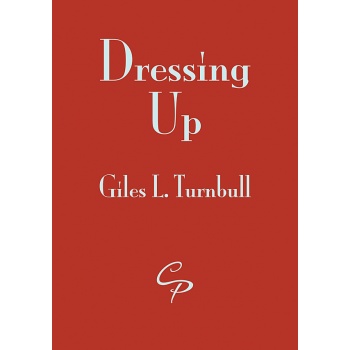
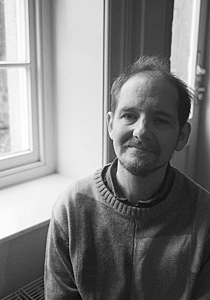
I asked Giles Turnbull to guest blog about his blindness and his writing. Giles is a poet who studied chemistry at Swansea University and lives in Abergavenny. His poems and articles have appeared in Corncrake, Fair Acre Press, Poetry Wales and Rockland and his debut pamphlet, Dressing Up, will be published by Cinnamon Press in 2017.
Giles writes:
The last colour I remember seeing was outside the doctor’s office where I lived at the time, Decatur, GA, and it was the yellow of some daffodils (or jonquils as they’d probably have been in America). I don’t see colours any more, though the tiny bit of usable sight I have allows me to notice strong contrasts and movement, so if you wave your hand in front of me or open a door in my line of sight, then I may notice the movement and be able to deduce that it is a door or a hand based on where I am at the time. If I am following you around a supermarket and you are wearing a black and white, or blue and white, striped jumper then the contrast between the colours is definitely something I am likely to notice. I’m not sure if that means I can ask any audience members to wear striped jumpers and t-shirts if they want to come to one of my poetry readings — maybe I could offer a £1 voucher off a copy of my pamphlet for anybody arriving in stripes that I can see?
I had been a sighted poetry writer for 13 years before my sight began to fail. You could say it was the result of addiction — people who find themselves turning into diabetics with a serious chocolate bar and cake addiction often are on the road to blindness and kidney failure, both of which were waiting to embrace me in my thirties.
Blindness hasn’t changed the way I write poetry, maybe because I have a good store of visual memories to fall back on when I want to imagine something, but it has affected the ways I experience poetry. Sadly, contrary to what movies would have you believe, blindness did not make me able to hear a pin drop across the other side of the city, as Daredevil gave me the impression I should be able to do. What blindness does intuitively make you do is pay more attention to what you are hearing; such as the way the pitch changes as you fill a cup closer and closer to its rim, or the way different people have identifiable footsteps when you’ve heard them a few times. It’s not something I go out of my way to bring into my poetry, but it is something that has found a place organically, more-so than before I lost my sight.
Many people who are blind do have, or develop, very good memories; predictably enough I am not one of them. In all forms of writing it is encouraged to read your work aloud as you are writing it, so that you get a feel for how well the words and the story take shape off the page. If you don’t have a good memory and can’t read a printout, that becomes a little tricky. This is where technology steps in to lend a hand.
Almost everything I do these days involves my computer which has screen reading software installed. It reads any text — emails, websites, poetry I’m writing, word documents and PDF files I’ve downloaded, tweets, Facebook posts and so on. You have probably seen footage of renowned physicist Stephen Hawking where he talks using speech software that is not a million light years different from the screen reading program I am using. Stephen’s computer system is described on his website; essentially he uses face gestures to write words and sentences, and the computer then reads them aloud. My screen reader similarly reads any text that appears on screen, which can be a poem I am typing or an electronic document I am reading. This is brilliant, and I’d be lost without my screen reader. But the side-effect of this, combined with my poor memory, is that it is the computer’s voice that I am hearing, not my own voice. My screen reader, NVDA (Non-Visual Desktop Access) comes with a range of voices, some of which are very electronic and others are much more human-sounding. Publishers sometimes do produce Kindle versions of their books but, even when a Kindle book has speech enabled, the Kindle device itself has always been pretty inaccessible, so I have never owned one. I am therefore very grateful to publishers who do have PDF versions of their books available for purchase, or are willing to let me have a final proof PDF when I speak to them and ask nicely. Audiobooks are brill, but poetry is less likely to make it into audiobook form than novels do.
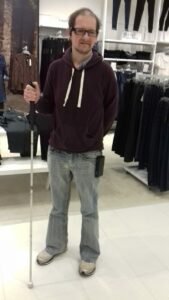
My writing life took an unexpected twist back in September 2016. I bought a pair of glasses. Maybe I do have some superpower hearing, because I can hear you thinking, “What use are glasses to a blind person?” Well the explanation lies in the lenses … or lack of them.
On the right hand arm of the frames, up at the front near where the lens would be, there is a tiny camera. There is a cable running down to a control unit, which in this photo is clipped to the left pocket of my jeans. By my right ear there is a small speaker. Not being able to see the photo myself I’m not certain all of those bits are visible in the pic, but that’s where they are.
If I hold a book up so that it is in line of sight of the camera, I can press the trigger button on the control unit and the camera will take a photograph that the unit will then attempt to read any text that it sees, which I will hear through the speaker by my ear, or through personal headphones, or through an external speaker. I use them around the house, to read any snail mail that arrives and to identify ready-meals in the fridge, which helps to stop me putting a lasagne into the oven assuming it was a fish pie. The RNIB website has a good description of the Orcam device on their website at http://www.rnib.org.uk/nb-online/orcam.
When I bought my pair I hoped that they would be helpful if ever I want to read a poetry book or pamphlet without being able to get hold of an electronic copy, but I had not thought that they could also help me read my work aloud.
I tried this out first at a creative writing group I attend. We had been asked to try writing something for children, so I wrote a short poem called DinDins. I took a printout and my glasses to the creative writing group, and when we went around the table reading our work, I used the glasses to read my poem aloud. It worked a treat, and when I returned home I made a recording of the poem, using the two voices available on the glasses — a British male voice called Brian, and an American female voice called Kendra. You can watch the video of me reading ‘DinDins’, a children’s poem, here. You’ll be able to hear the beep as the camera is activated and the sound of the camera shutter, followed by the reading of the poem.
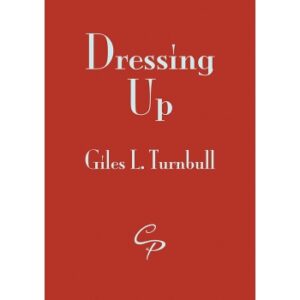 My debut pamphlet, Dressing Up, is being published by Cinnamon Press early in 2017 so I am planning to do some launch readings, at which I will read somewhere between six and ten poems, memory permitting, and then mid-way switch to the glasses to read 3 or 4 more. You can find my author page on the Cinnamon Press website at http://www.cinnamonpress.com/index.php/authors/168-giles-l-turnbull and there is a link to my pamphlet, Dressing Up, on that page.
My debut pamphlet, Dressing Up, is being published by Cinnamon Press early in 2017 so I am planning to do some launch readings, at which I will read somewhere between six and ten poems, memory permitting, and then mid-way switch to the glasses to read 3 or 4 more. You can find my author page on the Cinnamon Press website at http://www.cinnamonpress.com/index.php/authors/168-giles-l-turnbull and there is a link to my pamphlet, Dressing Up, on that page.
Having said that I don’t often write about blindness or use blind characters in my poems, I did discover, as I did my vision rehab training, that even people who have been totally blind since birth are likely to have favourite colours. Just as you were wondering about why a blind person would need a pair of glasses earlier, I suspect you might also be wondering how a blind person can have a favourite colour if they have never seen a colour or have not for a long time. So I would like to leave you with a poem about colours, which I hope goes a little way to explaining how.
Colours
Colours are the way you feel,
the tickle under barefoot feet
is green, emerald in the sun, viridian in the shade;
the skies are blue
singing with birds and be-anything clouds;
grey are the paths and brown the park benches
on which linger the people you’ve never met
the conversations you’ll one day have.
Yellow is the warmth that wraps an arm around
your shoulders, quiet and happy,
simple, and simultaneously profound,
Black is the unknown
the emptiness of someone gone
the fears we do not like to own.
Pink is a birthday, immediately unwrapped
giddy with ribbons and party friends
the kind of day that runs until we’re super tired, then ends,
collapsing into purple shades and closing eyes.
The stories and the dreams, white the sheet of paper, the field of snow waiting for footprints to bite.
This heart, red like nothing else
the essence of danger, love and life.
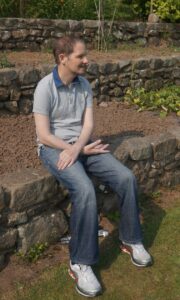
Next week gifted and versatile stitched textile artist, CHRISTINE ROLLITT, talks about her art and her ‘hand-dyed fabrics that focus on painterly qualities’.
LESLIE TATE’S BOOKS:

I interviewed artist Sarah Ross-Thompson whose exceptional Collagraphed prints use fabrics, lichen, porridge and string to create images of the dramatic Scottish Highlands where she

Part 2 of my interview with Mark Statman looks closely at Mark’s Latin American poetic influences, his life in Mexico and ends with an extract

I interviewed international poet and translator Mark Statman about Volverse/Volver, his 14th published collection. Mark, who has won national arts awards, is Emeritus Professor of Literary

I interviewed Lisa Dart, finalist in the Grolier, Aesthetica and Troubadour Poetry Prizes and author of The Linguistics of Light (poems, Salt, 2008), Fathom (prose

I interviewed writer Julia Lee Barclay-Morton about her experience of autism. Julia began as an experimental dramatist in New York, moving to the UK to
| Cookie | Duration | Description |
|---|---|---|
| cookielawinfo-checkbox-analytics | 11 months | This cookie is set by GDPR Cookie Consent plugin. The cookie is used to store the user consent for the cookies in the category "Analytics". |
| cookielawinfo-checkbox-functional | 11 months | The cookie is set by GDPR cookie consent to record the user consent for the cookies in the category "Functional". |
| cookielawinfo-checkbox-necessary | 11 months | This cookie is set by GDPR Cookie Consent plugin. The cookies is used to store the user consent for the cookies in the category "Necessary". |
| cookielawinfo-checkbox-others | 11 months | This cookie is set by GDPR Cookie Consent plugin. The cookie is used to store the user consent for the cookies in the category "Other. |
| cookielawinfo-checkbox-performance | 11 months | This cookie is set by GDPR Cookie Consent plugin. The cookie is used to store the user consent for the cookies in the category "Performance". |
| viewed_cookie_policy | 11 months | The cookie is set by the GDPR Cookie Consent plugin and is used to store whether or not user has consented to the use of cookies. It does not store any personal data. |
10 responses
Thanks for a lovely post. I always enjoy reading about different people’s experiences of reading and writing, especially when those experiences are so far from those which most of us have.
I also thought it was fun to discover that I share a name with the female voice on Giles’s glasses. 🙂
That’s such a nice comment. Thank you Kendra!
thanks Kendra! I will pretend that I actually know the voice of Kendra in my glasses now! I really do know the voice of the Co-Op supermarket self checkout machine! 🙂 xx
My mother went blind with glaucoma and I have been diagnosed at the same age – drops working so far and driving licence renewed for a limited period, slightly to my surprise. But as a fellow writer I was very grateful not just for the sensory insights (sorry) but also for the practical information for if and when the time comes. Will keep an eye open… Meanwhile if any self checkout machines tell me there’s something unexpected in my packing area ever again, I shall lash out in a blind fury – goodness, just typing a quick online response to someone Id never heard of before, it’s unnerving how many expressions involve vision! Sorry if that sounds cheap, it honestly did take me by surprise!
Hi Jessica, I have hereditary glaucoma as well. My drops were increased so I have to use two types for a total of three times a day (and they sting to apply) but the pressures have dropped. I also had trouble with the preservative in most drops, but kept raising the issue and have a better prescription now. It’s treatable!
thanks for the comment Jessica. I hope your eye drops keep your glaucoma under control. You are more than welcome to contact me through my website if I can be of any further help on learning about how sight problems can affect a writer’s life. Don’t worry about using words like insights or saying that you watched a TV program or read a book, becuase I use exactly those words even though I am listening to a TV show or to a movie with a descriptive audio soundtrack, and I say I’ve read a book when it’s the compyuter screen reader that has read it aloud for me. Listening to an audiobook I also think qualifies as reading a book because it is exactly the same text as printed on the page. Sighted people trip themselves up trying to find words other than ‘see’, ‘watch’, ‘read’ and most blind people find that really annoying!! 🙂 xx
A very interesting post, Leslie. It is wonderful that there is so much technology available to assist people who are visually impaired. Well done to Giles to have adapted so well and learned to make the most of life despite his disability.
thanks Robbie. I get worried when all the talking devices start chatting amongst themselves though! 😉
Fantastic and interesting read. ?
Your love of colour is amazing. Well done Giles!
Antoinette Rock
Cavan
Ireland
thanks Antoinette 🙂 xx